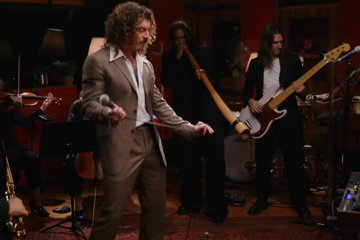Live Review: Molly Ringwald
Overall, it’s a mixed performance: during the sadder songs and the more frenetic pieces, the delivery is good, but for much of the night, the musicianship of the band and the clarity of Ringwald’s voice can’t overcome the overly safe interpretations of the work.

Dinner precedes the concert tonight, and so as the last of the crowd filters into the venue, it's to a soundtrack of plates being cleared and the bustle of waiters busily bringing last-minute drinks. The seating is laid out for dinner, rather than a concert – large round tables that require half the audience to reposition once the band comes onstage – and has a slight business conference vibe to it. Still, as the backing trio (piano, double bass and drums) strike up the first number, it's clear that the sound, at least, will be appropriately smoky.
As the band plays and the audience applauds, Molly Ringwald saunters on stage in a black cocktail dress and the gig proper begins. For the first few songs, the performance feels a little unsettled. Ringwald's voice is clear, with perfect pitch, but there's no real power behind these early numbers. Sondheim's Sooner Or Later in particular lacks the threat, or underlying sadness, that can lend the lyrics intensity, and is instead awkwardly sweet. I Get Along Without You Very Well (Except Sometimes) makes for a pleasant change of pace and is the evening's first highlight, as Ringwald sings with genuine emotion and seems to inhabit the song, rather than just repeating it. Don't Explain, written by Billie Holiday, sees similar commitment and becomes the crowning moment of the night. Ringwald takes to her seat for the piece, looking significantly more comfortable than she has while standing, and as her voice almost breaks on the final notes, it's hard not to be convinced by her performance.
Between songs, Ringwald treats the crowd to likeable anecdotes about her own life and less likeable references to her album. It's when she speaks with enthusiasm about the songs and their history that the banter really comes to life though, immersing the audience in the deep history behind the American Songbook, from which most of the set tonight is drawn.
An intermission extends interminably, but the second half begins significantly more upbeat and the group are at their best in these moments. Pianist and musical arranger Peter Smith gets repeated chances to shine, and Ringwald seems happier and more relaxed with some of the weight taken off her performance. Don't You (Forget About Me) is almost obligatory and receives the biggest cheer of the night, but it's not a great song and its flaws are apparent next to the rest of the repertoire this evening. Overall, it's a mixed performance: during the sadder songs and the more frenetic pieces, the delivery is good, but for much of the night, the musicianship of the band and the clarity of Ringwald's voice can't overcome the overly safe interpretations of the work.
Don't miss a beat with our FREE daily newsletter







